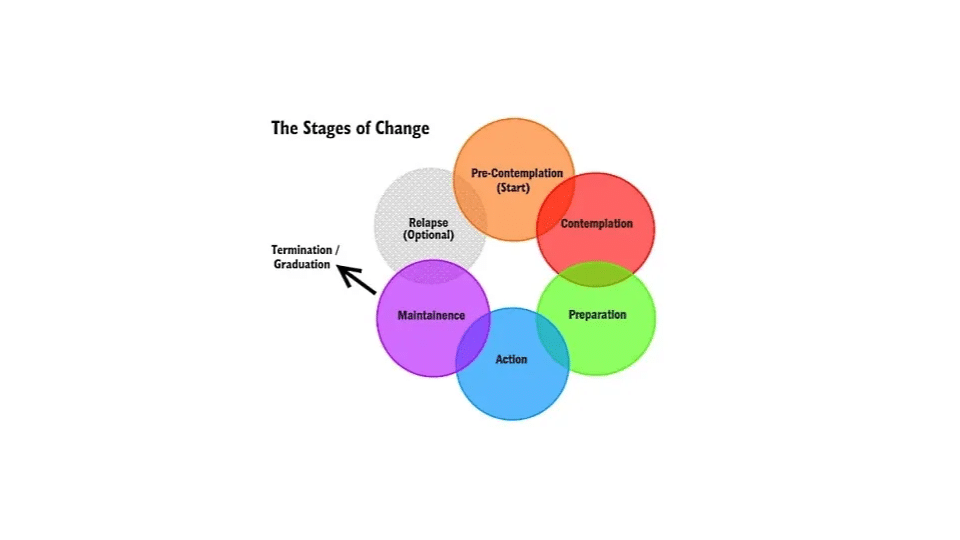
It’s Not That Hard, Right? By: Sarah Schufreider, MSW, LCSW
Thinking to Yourself: “I would really like to make a change in my life…”
Others:
- “You know what to do, so do it!”
- “It’s easy, you just need willpower.”
- “Other people have already made the change, so why can’t you?”
Time and time again, you have heard these statements or other similar sentiments in relation to trying to make a change. However, contrary to what we may have been told by others or even have told ourselves, change is HARD. Instead of being something that happens quickly, it is actually a multi-step process. Understanding this process can be integral in allowing ourselves an opportunity to make changes without feeling shame, guilt, or extreme disappointment.
Stages of Change Model
The Stages-of-Change Model was developed by James Prochaska and Carlo DiClemente and describes the 6 stages that occur when someone is working to implement a change to a behavior. Being able to identify and understand which stage you are currently in helps set reasonable expectations for next steps in the change process. Additionally, it helps to inform us as to which interventions you can use to move you more efficiently through that stage.
Pre-Contemplation (The I Don’t Have a Problem Stage): The initial stage is when an individual does not consider a behavior a problem and therefore, has virtually zero motivation to make a change. Outsiders may view the behavior as problematic, but someone in this stage does not share that point of view. Change is VERY unlikely to happen in this stage because motivation and buy-in is very low.
Ex. Person who smokes 2 packs a day of cigarettes and has no concerns about the impact to their future health.
Contemplation (Yeah….But Stage): This stage is when an individual recognizes that the behavior is problematic BUT is not ready to make any concrete plans to change the behavior. The person is aware that what they are doing is not the most helpful to their life, but does not yet have enough motivation or the buy-in to move forward with initiating change.
Ex. Person wants to be more physically active BUT is afraid of failing if they start a workout program.
Preparation (Getting It Ready Stage): This stage is when an individual starts gathering all the information that they need to make an informed decision about how to go about making a change. Preparation can look very different depending on what the change is and what each person needs to feel prepared.
Ex. Person wants to go back to school to get their Masters degree. In this stage, they might go to prospective student events, talk to current students and graduates, and look into financial aid options.
Action (I’m Doing This Stage): This is the first 6 months that the Change is ACTIVELY happening. During this stage, an individual is utilizing all the knowledge and tools they gathered during preparation, and is consistently living out the change.
Ex. Person wants to work on their mental health and starts seeing a therapist.
Maintenance (I’m STILL Doing This Stage): This is when someone has been in the action stage for more than 6 months and the change is now a regular behavior.
Ex. Person who wants to stop drinking alcohol and has remained sober for more than 6 months.
THE UNWANTED (BUT NORMAL AND EXPECTED STAGE)= Relapse AKA I’m Human Stage): This stage can occur at any point in the change process and is when a person regresses back to a previous stage. This stage can be extremely disappointing and is often a time when people feel shame and guilt. However, rather than viewing relapse as a failure, the Stages of Change Model sees relapse as a NORMAL AND EXPECTED part of the change process. Each time we relapse, we have an opportunity to learn more about what worked and what didn’t and it gives us a chance to adjust.
Ex. A person loses a significant amount of weight and then regains it one year later.
The beauty of this model is that it helps us see that there are many opportunities to work towards change and that change is not solely tied to a final outcome. It allows us the grace to find a path that works best for us and creates options for more individualized goals.
Many AMK Counseling therapists are trained on Stages of Change and Motivational Interviewing, a clinical technique that utilizes the Stages of Change model. If you are interested in exploring and learning more, please reach out to our Intake Department at intakes@amkcounseling.com or by phone at (773) 729-1967.
